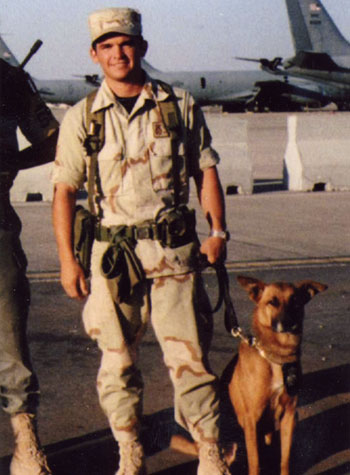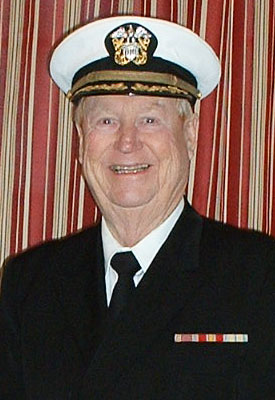by Pat McSparin // Spring 2011
The Servicemen’s Readjustment Act of 1944, better known as the GI Bill, has been called one of the most important pieces of legislation of the 20th century. It has helped make college possible for millions of veterans. A few of UMKC’s veteran alumni share their stories here.

From training bomb dogs to teaching kids
As a senior airman in the United States Air Force, Chad Morgan (B.A. ’00) served as a K-9 handler. “I had a bomb dog,” he says. Today, he’s a middle school principal. Stationed at Whiteman Air Force Base, Mo., Morgan’s job with the Air Force was similar to that of a civilian police K-9 handler. He patrolled base housing and other parts of the base, including the flight line areas, and he conducted base entry point checks several times a week, searching cars coming on to the base. Morgan was also called out to any bomb threats in the area. “Someone once called a bomb threat in to Warrensburg High School (Mo.) and my dog and I went to the school to conduct the search,” he said.
He was also called on to provide security for important events like political campaign visits. “Military dogs are used to search areas of presidential candidate visits, high-profile dignitaries and so on,” Morgan said. “I had the opportunity to go to Iowa State University and work a speech for President Clinton. Getting to work with the Secret Service and see some behind-the-scenes preparation was exciting.” And while his job as a middle school principal seems like a world away from bomb-sniffing dogs, make no mistake: His experience in the military helps him succeed as an educator. “I learned about dealing with different situations—stressful situations,” he said of his military training. “I learned about dealing with adversity—how to handle it. The training made a huge difference. You learn to work together and get the job done.”
Morgan said the ability to handle stressful situations is important when dealing with kids—especially middle school kids. “My old principal used to say ‘they’re not done yet,’ ” Morgan said. “They’re in that weird stage where sometimes even their own parents don’t like them. But I really like middle school age because of the in-between range. You can still kid around with them but they still want your approval.” Morgan has an unusual vantage point when it comes to the students who are seeking his approval: He stood exactly where they stand. Morgan is principal of Senath-Hornersville Middle School in Hornersville, Mo., the same middle school he attended as a kid.
The GI Bill not only helped Morgan earn his degree. The support he received from the program also helped his wife, Shannon, earn her LL.M., at the UMKC School of Law. “My wife was going to law school. We were both full-time students, and we were taking more than the minimum class load,” he said. “She couldn’t work, so I had a full-time job. We used the GI Bill to supplement our income, it being expensive to live in Kansas City. We had never been to Kansas City before, so we just took it all in. We really tried to take as much in as possible during those three years we were there.”

20 years and three military branches
Ben Gaines’ (D.D.S. ’59) journey in the United States military started when he was a college freshman. Over the next two decades, he would make four stops while traveling through three branches of the military, earning his Doctor of Dental Surgery degree at UMKC, and eventually becoming a commander in the United States Naval Reserve. And it began with his first stop: the U.S. Army.
Gains enlisted in the Arkansas National Guard his first year at Arkansas A&M College. “I stayed in the Guard for 13 months,” he said. “When I returned to college, they asked who wanted out and I held up my hand.” His stint with the Army was short and sweet, but the brevity of that first tour belied the career that followed. During his junior year at Arkansas A&M, he enlisted in the United States Air Force. “It was during the height of the Korean conflict, and I had to choose whether I wanted to be drafted into the U.S. Army or volunteer for the Air Force,” he said. Second stop: the Air Force to serve four years of active duty.
He credits his time in service with helping him develop the discipline and commitment it took to achieve his academic and career goals. “Being on active duty changed my life,” Gaines said. “The training that I received and the folks I met gave me an outlook on life that I would not have obtained without it. The discipline is something that I think would help many of our young folks deal with today’s ordeals.”
As a physical education major with minors in math and chemistry, Gaines had 120 credit hours when he enlisted in the Air Force. “After three years in the Air Force,” he said, “somebody suggested that I go to medical school. I said, ‘No.’ Then someone suggested I go to dental school. So I said, ‘Yes.’” He was accepted into the UMKC School of Dentistry, and he credits the G.I. Bill with helping make earning his D.D.S. possible.
But he wasn’t done with his journey in the military. Upon finishing dental school, he made stop number three: back to the Army. “I enlisted in the Missouri National Guard as a probationary 2nd Lieutenant pending my graduation from dental school,” Gaines said. “I applied for active duty at Fort Sam Houston and upon receiving my Doctor of Dental Surgery, I received my commission as a 1st Lieutenant in the U.S. Army Dental Corps.”
Gaines transferred to the Arkansas National Guard and commanded the medical detachment of an artillery battalion, but the tour was brief. “At the end of my first year, they were unable to promote me because I was a dentist serving in a physician’s slot,” Gaines explained. “A friend was the commanding officer of the naval reserve unit, and he encouraged me to transfer to his unit.” Gaines took his friends’ advice and made the fourth and final stop in his military career: he transferred to the U.S. Naval Reserve. More than 20 years after first joining the Arkansas National Guard, Dr. Ben Gaines retired as a Commander, Dental Corps, USNR. “I did not plan to serve in three branches of the armed forces when I started,” Gaines said, “but I’m glad that I did. I learned something from each of them.”
